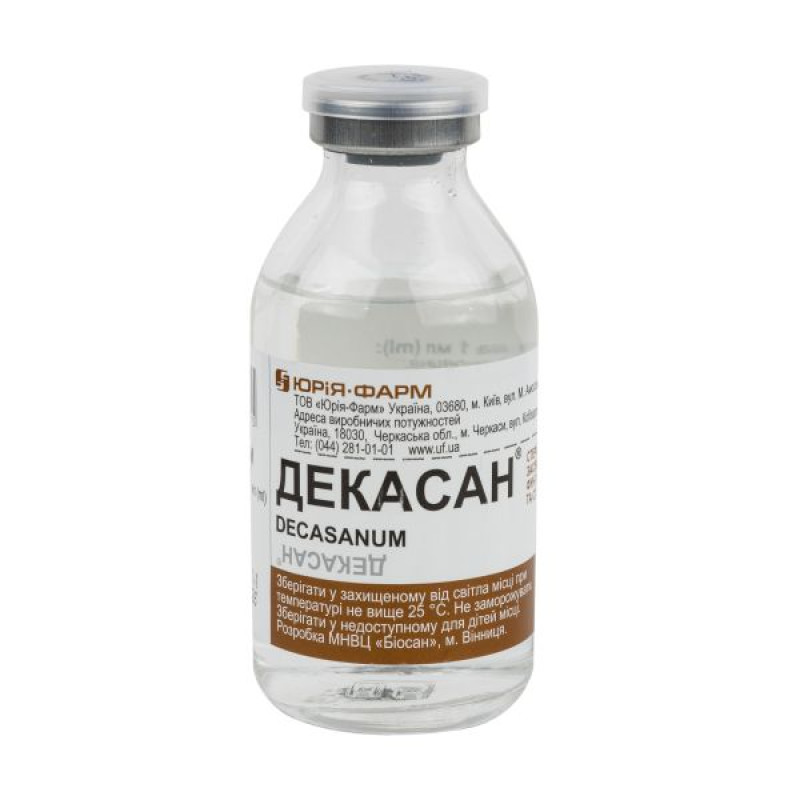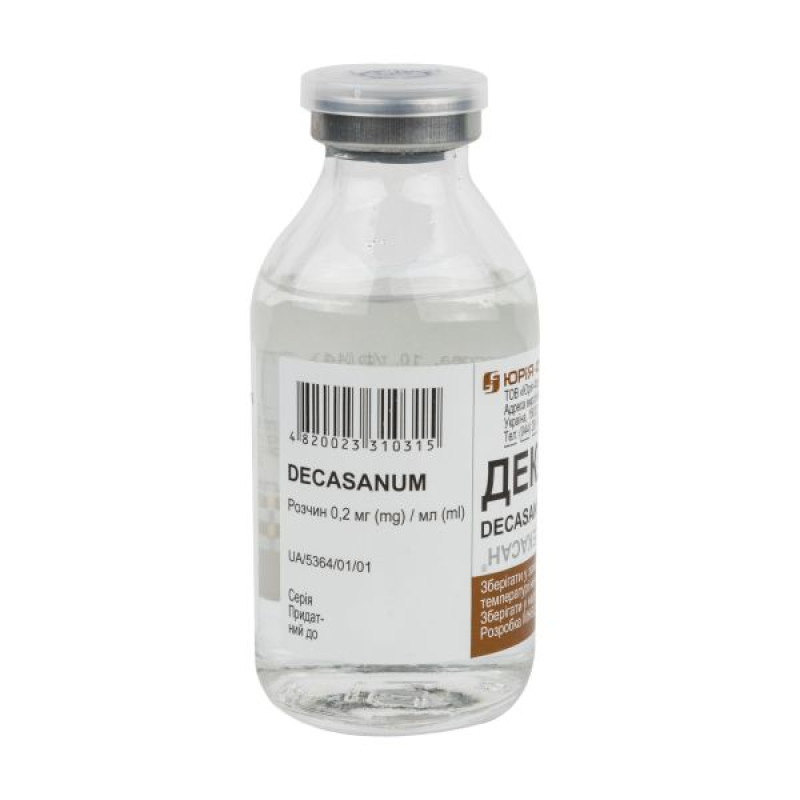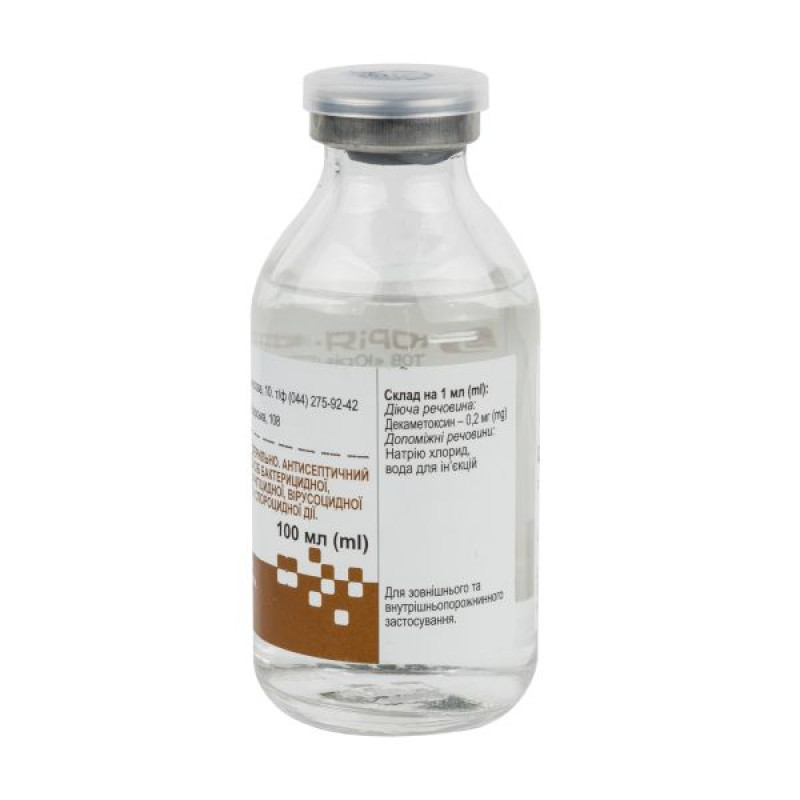Decasan solution 0.2 mg/ml bottle 100 ml

Instructions for use Decasan solution 0.2 mg/ml bottle 100 ml
Composition
active ingredient: decamethoxine;
1 ml of solution contains 0.2 mg of decamethoxine;
Excipients: sodium chloride, water for injections.
Dosage form
Solution.
Main physicochemical properties: transparent colorless solution.
Pharmacotherapeutic group
Antiseptics and disinfectants. ATX code D08A.
Pharmacological properties
Pharmacodynamics.
Decasan has an antimicrobial antifungal effect, concentrates on the cytoplasmic membrane (CPM) of the microbial cell and combines with the phosphatide groups of membrane lipids, disrupting the permeability of the CPM of microorganisms. Decamethoxin has a pronounced bactericidal effect on staphylococci, streptococci, diphtheria and Pseudomonas aeruginosa, capsular bacteria and fungicidal effect on yeast, yeast-like fungi, pathogens of epidermophytosis, trichophytosis, microsporia, erythrasma, some types of mold fungi (aspergillus, penicillium), protistocidal effect on trichomonads, giardia, virucidal effect on viruses. Highly active against microorganisms resistant to antibiotics. Forms resistant to decamethoxin are formed slowly and in small quantities with prolonged use. Bacteriostatic (fungistatic) concentrations are similar to its bactericidal (fungicidal), virucidal, and protisticidal concentrations. During treatment with the drug, the sensitivity of antibiotic-resistant microorganisms to antibiotics increases.
An in vitro study conducted on VeroE6 cell cultures confirmed that decamethoxine at a concentration of 0.2 mg/ml has a pronounced virucidal effect against the SARS-CoV-2 virus (coronavirus), which causes the COVID-19 coronavirus disease, with an exposure duration of 60 seconds, which is expressed in a decrease in the infectious titer of the virus.
Pharmacokinetics.
The drug is practically not absorbed by mucous membranes, intact skin and wound surfaces.
Indication
Treatment of pustular bacterial and fungal skin diseases, microbial eczema, purulent-inflammatory lesions of soft tissues (abscesses, carbuncles, phlegmons, furuncles, purulent wounds, panaritium); dental diseases (stomatitis, ulcerative-necrotic gingivitis, dystrophic-inflammatory form of periodontitis of I-II degree in the acute stage).
Also indicated for lung abscess, bronchiectasis, cystic lung hypoplasia complicated by suppuration, chronic bronchitis in the acute phase, chronic tonsillitis, angina, carriage of staphylococci and diphtheria bacilli, ulcerative colitis, paraproctitis.
In gynecological practice - for the treatment of candidiasis of the vaginal mucosa, inflammatory diseases of the genitals of microbial origin, prenatal sanitation of the birth canal, treatment of postpartum endometritis.
Purulent-inflammatory diseases of the abdominal and pleural cavities.
For hygienic disinfection of the skin of the hands of medical personnel and rubber gloves during examination of patients and performance of medical manipulations and minor surgical interventions, pre-sterilization disinfection of medical instruments and diagnostic equipment made of metals, rubber, polymeric materials and glass.
Contraindication
Individual hypersensitivity to the components of the drug.
Interaction with other medicinal products and other types of interactions
Pharmaceutical: Decamethoxine is a cationic surfactant, so it is incompatible with soap and other anionic compounds.
Pharmacodynamic: decamethoxine increases the sensitivity of antibiotic-resistant microorganisms to antibiotics.
Application features
Decamethoxine in the concentration used in Decasan® has no toxic effect. Long-term use of Decasan does not cause any toxic reactions. Heating the drug to 38 °C before use increases the effectiveness of the action. In case of inflammation and skin irritation, dilute the drug with distilled water in a ratio of 1:1 or 1:2.
Use during pregnancy or breastfeeding
There are no precautions for use during pregnancy or breastfeeding.
Ability to influence reaction speed when driving vehicles or other mechanisms
There are no warnings regarding the impact on the reaction speed when driving or working with other mechanisms.
Method of administration and doses
Oral mucosal lesions should be treated by application of 25-50 ml for 10-15 minutes or rinsing (100-150 ml). Dystrophic-inflammatory form of periodontitis of I-II degree in the acute stage should be treated by irrigation with a warm solution of pathological gingival pockets (50-70 ml) or applications on the gums until the inflammatory phenomena subside. Patients with candidal lesions of the oral mucosa, ulcerative-necrotic gingivitis should be prescribed oral rinsing (100-150 ml) 4 times a day for 5-10 days.
Treatment of tonsillitis and chronic tonsillitis is carried out by washing the lacunae of the palatine tonsils (50-75 ml per wash).
Sanitation of carriers of staphylococcus, diphtheria bacillus should be carried out by rinsing the throat with a solution, washing the lacunae, irrigation of the nasopharynx, tonsils. The lacunae should be washed 3-5 times every other day.
In adults with lung abscess, bronchiectasis, cystic hypoplasia of the lungs complicated by suppuration, chronic bronchitis in the acute phase, Dekasan® should be administered endobronchially:
through a microtracheostomy, 25-50 ml 1-2 times a day; through a transnasal catheter, 5-10 ml 1 time a day; by ultrasonic inhalation, 5-10 ml 1-2 times a day; by lavage of the tracheobronchial tree in a volume of 100 ml.
The duration of treatment is 2-4 weeks.
When treating purulent-inflammatory diseases of the abdominal and pleural cavities, fill the affected area to the edges with Dekasan® with an exposure of at least 10 minutes. If necessary, including when suturing "tightly" (without drainage), carry out multiple filling of the operating cavity with subsequent removal of the solution to clean washing waters. Flow-washing drainage of the cavity is performed using drains or by the puncture method.
For the treatment of microbial and fungal trichomonad lesions of the vaginal mucosa, Dekasan® should be used in the form of douching (50-100 ml of the drug heated to 38 ° C 3 times a day). In the same way, perform prenatal sanitation of the birth canal once. Treatment of postpartum endometritis should be carried out by washing the uterine cavity with a warm drug (150-200 ml) 2 times a day.
Disinfection of the skin of hands and rubber gloves should be carried out by applying 5-10 ml of the drug to a previously washed surface to be disinfected for 5 minutes.
Disinfect cleaned medical instruments, mouthpieces, tubes, and equipment by immersing them in the solution for 30 minutes.
Children
Use for the treatment of children aged 12 years and older with chronic bronchitis in the acute phase, by ultrasonic inhalation method, 5-10 ml 1-2 times a day. For other indications, there is no experience of use in children under 18 years of age.
Overdose
Due to the lack of absorption, overdose is not observed.
Side effects
In rare cases, some patients may have increased individual sensitivity. In such individuals, after using the drug, skin rashes, burning, dryness, itching and other local allergic reactions may occur; with endobronchial administration, a feeling of heat behind the sternum may appear, which disappears 20-30 minutes after the end of the procedure.
Expiration date
3 years.
Storage conditions
Store out of the reach of children and protected from light at a temperature not exceeding 25 ° C. Do not freeze.
Packaging
50 ml or 100 ml, or 200 ml, or 400 ml in glass bottles. 50 ml or 100 ml, or 250 ml, or 500 ml, or 1000 ml, or 2000 ml, or 3000 ml, or 5000 ml in polymer containers. 2 ml or 5 ml in a single-dose container; 4 or 8, or 10 or 12 containers in a pack.
Vacation category
Without a prescription.
Producer
LLC "Yuria-Pharm".
Address
Ukraine, 18030, Cherkasy region, Cherkasy city, Kobzarska st., 108, tel. (044) 281-01-01
There are no reviews for this product.
There are no reviews for this product, be the first to leave your review.
No questions about this product, be the first and ask your question.








